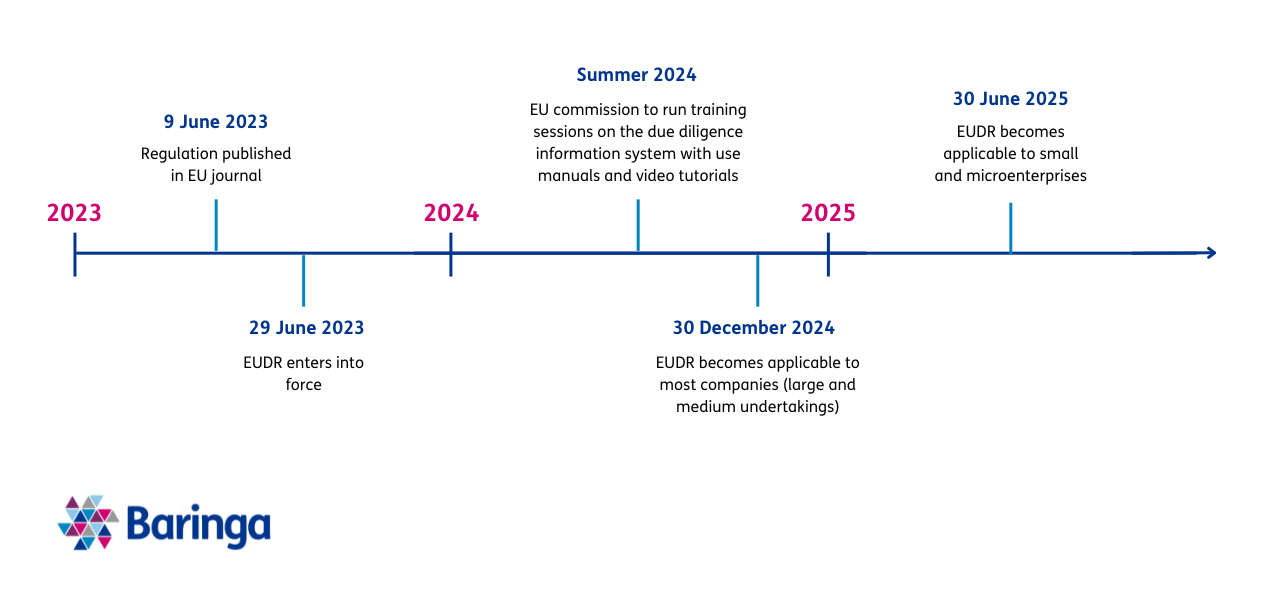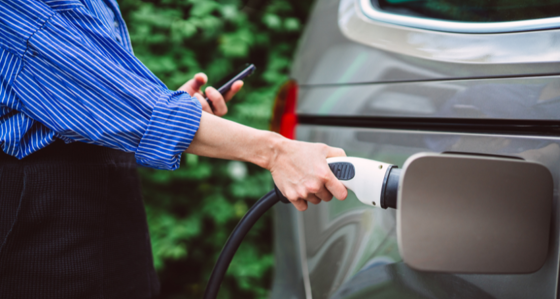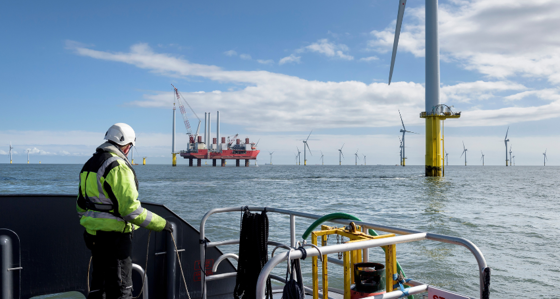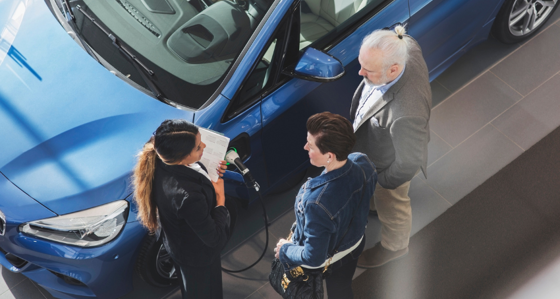
Preparing for the EU's regulation on deforestation-free products
4 min read 26 September 2024
Are your products and supply chains prepared for the incoming EU Deforestation Regulation? In this article we share what you need to know in preparation for the new regulation, and how Baringa can help you.
Overview of the EU Deforestation Regulation
The EU Deforestation Regulation is a comprehensive framework aimed at addressing the impact of global supply chains on deforestation and forest degradation. The regulation seeks to combat the adverse environmental and social effects of deforestation by promoting sustainable sourcing of key commodities such as soy, beef, palm oil, and timber. It is a significant step towards ensuring that products placed on the EU market are produced in a manner that respects human rights, biodiversity, and the environment.
Key commodities covered
The scope of the EU Deforestation Regulation is broad, encompassing a range of key commodities, which are used in a wide array of consumer products. The regulation applies to both imported and domestically produced commodities, ensuring that all products placed on the EU market adhere to sustainable sourcing requirements. It also covers a wide range of economic operators, including producers, traders, and retailers, who participate in the supply chain of these commodities. They include Cocoa, Coffee, Soy, Palm oil, Wood, Rubber, and cattle.
Importance of the regulation
The EU Deforestation Regulation is highly relevant in the context of global efforts to combat deforestation and its associated impacts. It reflects the EU’s commitment to promoting sustainable development and responsible business practices, both within its borders and beyond. By imposing requirements on economic operators to source commodities sustainably, the regulation aims to drive positive change in the production and trade of key commodities, thereby contributing to the protection of forests, biodiversity, and the rights of local communities in producing countries. The regulation also aligns with the EU's broader environmental and climate objectives, including the European Green Deal and the EU's commitment to achieving carbon neutrality by 2050.
Compliance requirements for operators
Operators that sell goods in the EU are required to prove the product is deforestation-free when the product itself, its ingredients or its derivatives have been produced on land where no deforestation has occurred after the cut-off date of the 31 December 2020. Operators are expected to conduct due diligence to assess and mitigate the risk of sourcing products linked to deforestation. This includes implementing traceability systems, conducting risk assessments, and taking measures to prevent or mitigate adverse impacts on forests and other ecosystems. Further, they must ensure available evidence for their operations to provide assurance on compliance. Economic operators are required to provide information on the origin and characteristics of the commodities they place on the EU market, enhancing transparency and accountability throughout the supply chain.
The regulation also establishes a framework for the recognition of voluntary certification schemes that demonstrate compliance with sustainable sourcing criteria. Additionally, the regulation includes provisions for enforcement and penalties in cases of non-compliance, ensuring that economic operators adhere to the sustainable sourcing requirements. Penalties for in-scope undertakings include fines up to 4% company turnover, exclusion of public funding, exclusion from EU markets, confiscation of goods and reputational damage.
Development timeline of the regulation
The EU Deforestation Regulation has undergone a multi-stage process of development and adoption. The European Commission first proposed the regulation in 2019 as part of the EU’s broader efforts to address deforestation and promote sustainable supply chains. Following a period of consultation and negotiation, the European Parliament and the Council of the European Union reached a political agreement on the regulation in 2021. It will become applicable for large and medium undertakings from January 2025 and from June for small and microenterprises (as defined by the EU).
The EU Deforestation Regulation represents a significant step towards promoting sustainable sourcing and combatting the adverse impacts of deforestation on global supply chains. Its broad scope, relevance to environmental and social objectives, and comprehensive requirements for economic operators make it a key instrument in the EU’s efforts to address deforestation and promote responsible business practices.

How Baringa can support your compliance?
Risk assessment and mitigation: Baringa can assist you in conducting comprehensive risk assessments to identify the potential impact of your sourcing activities on deforestation. This may involve analysing and restructuring supply chains, identifying high-risk areas, and assessing the potential for deforestation within the supply chain.
Data solutions and engineering (e.g. traceability systems implementation): Baringa can help you implement traceability systems to track the origin of products and raw materials throughout the supply chain. This may involve the use of technology, data analytics, and process optimisation to create transparent and traceable supply chains to ensure compliance.
Adverse impact prevention and mitigation: Baringa can collaborate with you to develop and implement measures aimed at preventing or mitigating adverse impacts on forests and nature. This may involve developing sustainable sourcing strategies, engaging with suppliers to promote responsible practices, and implementing monitoring and reporting mechanisms to track progress.
These services can help clients comply with regulations and industry standards related to deforestation, traceability, and environmental impact, supporting sustainable and responsible sourcing practices.
To find out more about EUDR and sustainable supply chain management tools that can help your business, please contact David Kane or Dan Lane.
Our Experts

Related Insights

Trump trade tariffs: Impact on the UK EV uptake
The global automative industry is at a critical juncture, shaped by intersecting forces of electrification, geopolitical trade tensions, and national decarbonisation policy.
Read more
Create an “offshore energy mission control”, new report to argue
The UK needs to create an offshore energy “mission control” that has the power to cut through and connect different stakeholders, from government bodies, to oil and gas operators, renewables developers and financial institutions, argues a new report commissioned by Offshore Energies UK (OEUK) and created by management consultancy Baringa.
Read more
Driving economic growth by securing a cleaner and resilient future for the North Sea
Our report, published in conjunction with Offshore Energies UK (OEUK), outlines how the North Sea can continue to play a pivotal role in the energy system as the world shifts to net zero, while positioning the UK as a resilient, innovative and competitive player in the global energy landscape.
Read more
From early adopters to early majority: Driving the next phase of EV growth
As EVs are moving beyond the early adopter phase, what are the principles needed for mass market adoption and progressing towards net zero targets?
Read moreIs digital and AI delivering what your business needs?
Digital and AI can solve your toughest challenges and elevate your business performance. But success isn’t always straightforward. Where can you unlock opportunity? And what does it take to set the foundation for lasting success?